Comedy, Tragedy, and Religion
Comedy, tragedy, and religion have been intertwined since ancient Greece, where comedy and tragedy arose as religious rituals. This book analyzes the worldviews of tragedy and comedy, and compares each with the world's major religions. Morreall contrasts the tragic and comic along twenty psychological and social dimensions and uses these to analyze both Eastern and Western traditions.
Search in google:
Comedy, tragedy, and religion have been intertwined since ancient Greece, where comedy and tragedy arose as religious rituals. This book analyzes the worldviews of tragedy and comedy, and compares each with the world's major religions. Morreall contrasts the tragic and comic along twenty psychological and social dimensions and uses these to analyze both Eastern and Western traditions. Publishers Weekly How does a comic vision of life fit into a religious worldview? Doesn't a tragic vision of life better suit a religious vision? Morreall (Taking Laughter Seriously) provides an accessible survey of the roles that comic visions and tragic visions play in various religions. The author opens his study by examining what he sees as the connections between tragedy, comedy and religion. He argues that all three focus on the incongruities of life and the "disparity between the way things are and the way things should be." Thus, he notes, irony is a prominent feature in the attitudes of comedy, tragedy and religion toward the world. Morreall discusses the nature of tragedy and the nature of comedy, respectively, in two short chapters. He concludes that tragedy "recommends that we be emotionally engaged with incongruities and that we overcome and solve them." Comedy, on the other hand, "encourages an emotional disengagement from our own problems... and playfulness and laughter are comic paradigms for responding to real-life incongruities." The author asserts that religion uses elements of both comic vision and tragic vision to address the incongruities of life. In a series of five chapters on Hinduism, Buddhism, Judaism, Islam and Christianity, he demonstrates the various ways in which each religion appropriates both comic and tragic features in its teachings and practices. For example, he argues that Eastern religions lack a tragic vision of life because they do not focus on an individual struggling amid suffering, while Western religions, on the other hand, do. After a thorough study of the uses of comedy and tragedy in religion, Morreall's engaging little primer concludes that humor "not only fosters virtue, but is best seen as itself a virtue... an intellectual and moral excellence of the highest order." (July) Copyright 1999 Cahners Business Information.
AcknowledgmentsIntroduction11Some Basic Connections32The Nature of Tragedy73The Nature of Comedy134The Tragic Vision versus the Comic Vision215The Tragic and the Comic Visions in Religions416Eastern Religions497Western Religions738New Religions1319The Value of Humor in Religion147Notes155Bibliography165Index173
\ Publishers Weekly - Publisher's Weekly\ How does a comic vision of life fit into a religious worldview? Doesn't a tragic vision of life better suit a religious vision? Morreall (Taking Laughter Seriously) provides an accessible survey of the roles that comic visions and tragic visions play in various religions. The author opens his study by examining what he sees as the connections between tragedy, comedy and religion. He argues that all three focus on the incongruities of life and the "disparity between the way things are and the way things should be." Thus, he notes, irony is a prominent feature in the attitudes of comedy, tragedy and religion toward the world. Morreall discusses the nature of tragedy and the nature of comedy, respectively, in two short chapters. He concludes that tragedy "recommends that we be emotionally engaged with incongruities and that we overcome and solve them." Comedy, on the other hand, "encourages an emotional disengagement from our own problems... and playfulness and laughter are comic paradigms for responding to real-life incongruities." The author asserts that religion uses elements of both comic vision and tragic vision to address the incongruities of life. In a series of five chapters on Hinduism, Buddhism, Judaism, Islam and Christianity, he demonstrates the various ways in which each religion appropriates both comic and tragic features in its teachings and practices. For example, he argues that Eastern religions lack a tragic vision of life because they do not focus on an individual struggling amid suffering, while Western religions, on the other hand, do. After a thorough study of the uses of comedy and tragedy in religion, Morreall's engaging little primer concludes that humor "not only fosters virtue, but is best seen as itself a virtue... an intellectual and moral excellence of the highest order." (July) Copyright 1999 Cahners Business Information.\ \ \ \ \ Library JournalIn this groundbreaking study, Morreall (religious studies, Univ. of South Florida) argues that tragedy, comedy, and religion have been closely linked since the heyday of ancient Greece. All three are concerned with the successes and shortcomings of life; our responses to tragedy and comedy help us understand and evaluate human experience. Morreall analyzes 20 psychological and social contrasts between the tragic and comic worldviews. Through five comprehensive questions on the theme of suffering, he examines elements of both tragedy and comedy from the perspective of Eastern and Western religions. The book closes with a survey of new religions and a chapter on the value of humor in religion. An excellent, well-written study on an overlooked topic, this book makes a unique addition to collections holding more general surveys of world religions and will appeal to scholars and general readers alike.--Michael W. Ellis, Ellenville P.L., NY Copyright 1999 Cahners Business Information.\ \ \ BooknewsReminding readers that both drama forms arose in ancient Greece as religious rituals, Morreall (religious studies, U. of South Florida) analyzes the worldviews of tragedy and comedy, and compares each with the world's major religious. He contrasts the two along 20 psychological and social dimensions, then uses the differences to analyze both eastern and western traditions. Annotation c. Book News, Inc., Portland, OR (booknew.com)\ \








